Low-quality, inexperienced house flippers are tarnishing the market perception of investor renovated listings. Here’s what to look out for when encountering flipped properties during your home purchasing journey.
Popular reality shows on house flipping and DIY renovations give the illusion that quality, move-in ready properties are abundantly available for buyers seeking to make their homeownership dreams come true. To the novice homebuyer, everything appears to be new, fresh and turnkey, implying that there will be no weekend projects or contractor bids for many years to come. The reality of purchasing a flipped home, however, may be more heartache than delight, as not all flipped houses are equal.
To be clear, we are strong supporters of reputable professionals who do a quality and responsible job of restoring aging, neglected homes into turnkey properties that meet the needs of contemporary homebuyers. However, the enormous market need for older homes to be upgraded to modern standards has fueled an overabundance of lower quality, inexperienced house flippers who are tarnishing the market perception of “investor renovated” listings.
Here’s what to be wary of when encountering flipped properties during your home purchasing journey.
Table of Contents
- What’s a House Flip in Reality?
- Why You Should Never Waive Your Home Inspection
- What to Look Out for in a Flipped Property
- Pre-Sale Renovations: An Alternative to Poorly Flipped Houses
- How the Real Estate Industry can Help Remedy the Phenomena of Poorly Flipped Properties
- Closing Comments
Also see:
What’s a House Flip in Reality?
When a real estate investor purchases a home, usually for a largely discounted price, then updates, repairs and relists the home, it is known as a “house flip”. The term “flip” refers to a quick turnaround, usually a period of a couple of months to a year, or slightly longer. The key motivation of investors (AKA house flippers) is to make a quick profit, while using the proceeds to fund their next projects.
Shows such as HGTV’s Good Bones, Flip or Flop and Fixer Upper paint an extremely positive picture of the $600+ billion dollar house flipping industry. However, as we have witnessed from a recent open house, not all investors and flippers are equal in their construction capabilities nor trade professionalism.
The good news is that the market opportunity is so large that it has already attracted many reputable companies that are striving to improve the efficiency, quality, reliability and cost of how aging and out-dated housing stock is being updated to current standards. Because these companies are in this space for the long haul, they have economic incentives to maintain stellar reputations among key partners in the real estate industry: real estate agents, construction contractors, homeowners, inspectors and local building code administrators.
The Reality of Many Flipped Houses
Smaller, lesser-known, and lesser-experienced home flippers, who are motivated more by quick profits than by establishing a reputation of quality work, represent the bulk of the risk to prospective homebuyers. Independently flipped homes present the following challenges to prospective buyers:
- Loss of historic data and information from the last homeowner who lived in the property
- Vague or non-existent seller disclosure information
- Lack of market information on the investor (e.g. experience and qualifications; online reviews; previously renovated properties; current homeowner satisfaction levels; etc.)
Why You Should Never Waive Your Home Inspection
In a tight housing market, eager buyers are scrambling to purchase homes that have been flipped by real estate investors, as they believe that these homes require no immediate fixes.
In their haste, many prospective buyers have waived their right to an inspection by a qualified home inspector, at the peril of buying a “resurrected” home that has never been inhabited since the remodeling occurred.
Shoddy work, cut corners and poor workmanship become evident once the new buyers begin living in the home, as only day-to-day living can uncover electrical, plumbing and construction failures that were likely not evident during a cursory walk through.
We implore all prospective homeowners, NEVER waive your right to a home inspection. The buyer’s inspector is your agent who is contracted by you to protect your investment interest.
Do not allow a realtor to pressure you into waiving the home inspection, when trying to convince you that this is a necessary tactic to get your bid accepted. In fact, we would go a step further and recommend hiring another realtor immediately, if your realtor suggests that you waive the home inspection!
Also see:
What to Look Out for in a Flipped Property
Sewer Lines
Although normally not part of a home inspection, a complete sewer line assessment should be performed, especially in homes older than 20 years. Unfortunately, most homeowners give very little thought to their sewer line’s health until a massive breakdown occurs.
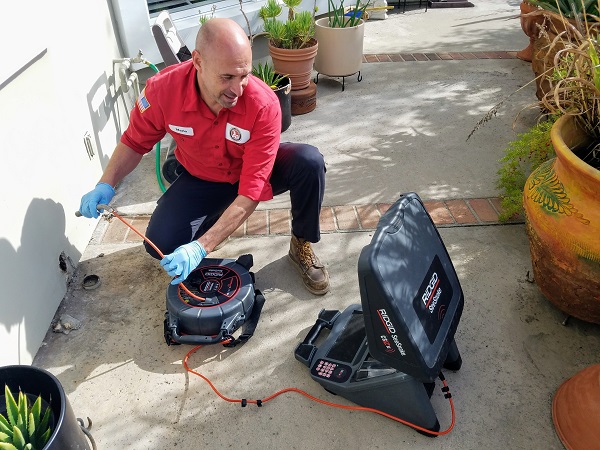
Since the average age of the U.S. housing inventory is greater than 40 years old, it is necessary to determine if the home you are planning to purchase has any stoppages, sewer line breaks or roots growing into a line’s corroded structure. Check the front yard for wet, soft earth, especially if there has not been inclement weather in the area for at least a week. Sewage back up stench is hard to ignore.
Since investors rarely live in the homes they flip, they would have little knowledge on the functionality of the home’s sewer line. In the seller’s disclosure statements the responses for areas such as sewer lines, are likely peppered with “Unknown”.
Issues with sewer lines can be easily repaired, thanks to modern technology, and in most cases no longer require that you break into the home’s interior flooring or exterior hardscaping to rectify the problem. Knowing the issue upfront and obtaining a bid from a plumber who can provide a definitive price to cure, will give you peace of mind going into the deal, if you insist on purchasing a questionably flipped property.
Also see:
- Non-Invasive Plumbing Tech for Repairing Your Home’s Sewer Line
- Repiping Your House: Early Signs It Might be Time to Repipe
- The Traits & Risks of Dangerous Trees: Is Your Property Safe?
Mold
Many unscrupulous flippers will attempt to hide water intrusion and ensuing mold issues with a coat of fresh paint. Know this and be suspicious of hurriedly painted ceilings, which appear to have been painted by an amateur.
Just the smell of paint alone, should make you suspicious, especially in areas that were not totally remodeled. Since mold has a very distinctive smell, trust your instincts and nose, and make sure to inspect crawlspaces, where water is prone to settle, and mold will thrive.
Also see:
- Mold Removal: 4 Steps to Remediate Mold from Your Home
- How to Choose a Water Leak Detection System for Your Home
Roof
A leaky roof will probably never be evident until the worst possible moment, such as during a rain storm right before your Christmas dinner party is set to begin. Your inspector will be able to tell you the condition of the roof and whether he recommends a new roof before the actual sale is fully executed.
A poorly flipped and remodeled home will most likely not have a new roof, as this is a costly expenditure and runs counter to an unscrupulous flipper’s agenda:
“Get in cheap, get out fast, with minimal investment”
Although seller disclosures cover roof age and condition, make sure to ask the seller for any and all paperwork, if they insist that a new roof was installed within the last ten years. You want to know which contractor you can call should a 15 to 20 year-old roof fail during your first five years in the home, as many new roofs are under warranty for at least 10 to 15 years.
Also see:
- Need a New Roof? Why You Should Give Solar Shingles a Chance!
- What to Consider Before Purchasing a Solar Panel System for Your Home
- If You Own a Fireplace, You’ll Want to Read This
Framing Structure
Structure failures caused by defects in framing are evident just by walking through the property and taking note of flooring – does it bounce or squeak? Flooring issues may be caused by improper joist spacing and can lead to structural collapse.
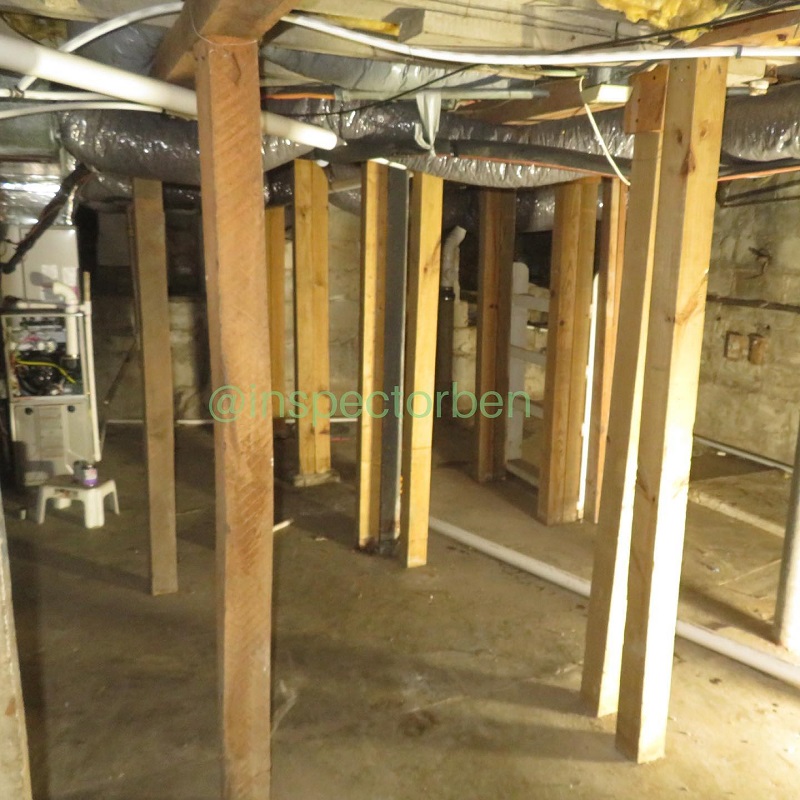
Bad Framing
Photo courtesy of Ben Hendricks, ABI Home Inspection Services
Even though structural changes require a permit in most jurisdictions, someone looking to make a fast dollar would forego the permitting process and leave you with a sizable remediation issue. Bouncy, squeaky floors can be a sign that the loads within the home are not properly supported, as per the building code.
Another issue to look for when touring a flipped home is sticking windows or cracked drywall or door jambs with increasing margins as this could be an indication the beams that support the structure have been improperly oriented. This is mostly true when a manufactured product, called “glulams” or laminated beams, is used instead of solid wood. The glulam beams have a distinct “top” and “bottom” and must be oriented correctly if they are to perform correctly.
Painting
As previously noted, some flippers use paint as a means to obfuscate a real issue that cannot be resolved by a fresh coat of paint. As a prospective homeowner you need to investigate whether paint was used to conceal pre-existing damage or some more extensive defect. If you are serious about the property, make sure to visit several times at varying times of sunlight, imperfections may become evident with the right angle of the sun.

Water Damage Above Valance in “As-Is” Master Bedroom Valance
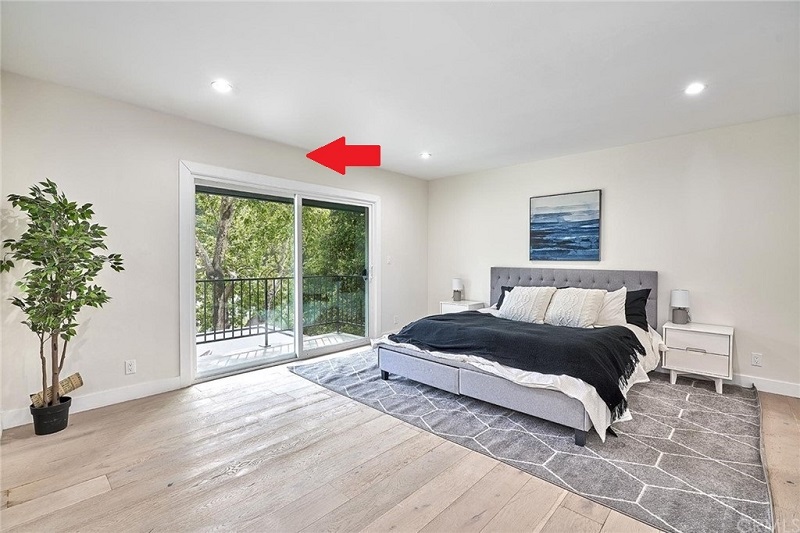
Post-Flipped Master Bedroom with Hidden Water Damage
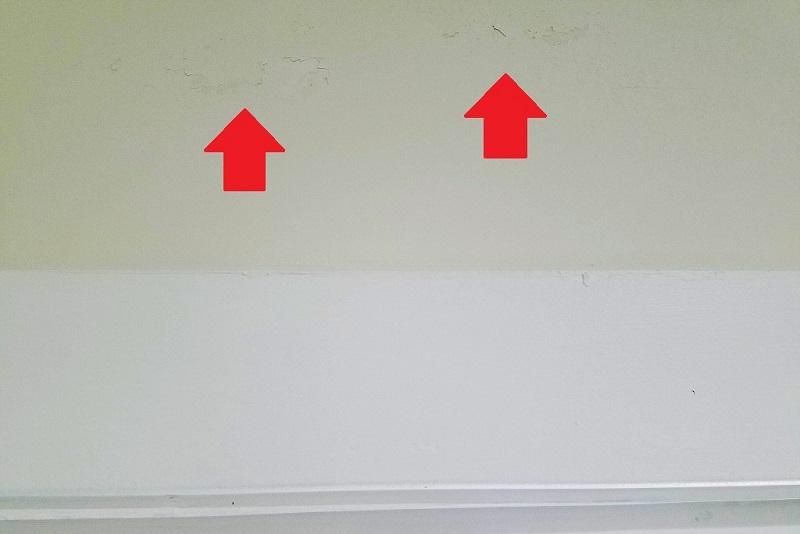
Close Up of Water Damage Post-Flipped Master Bedroom Above Valance
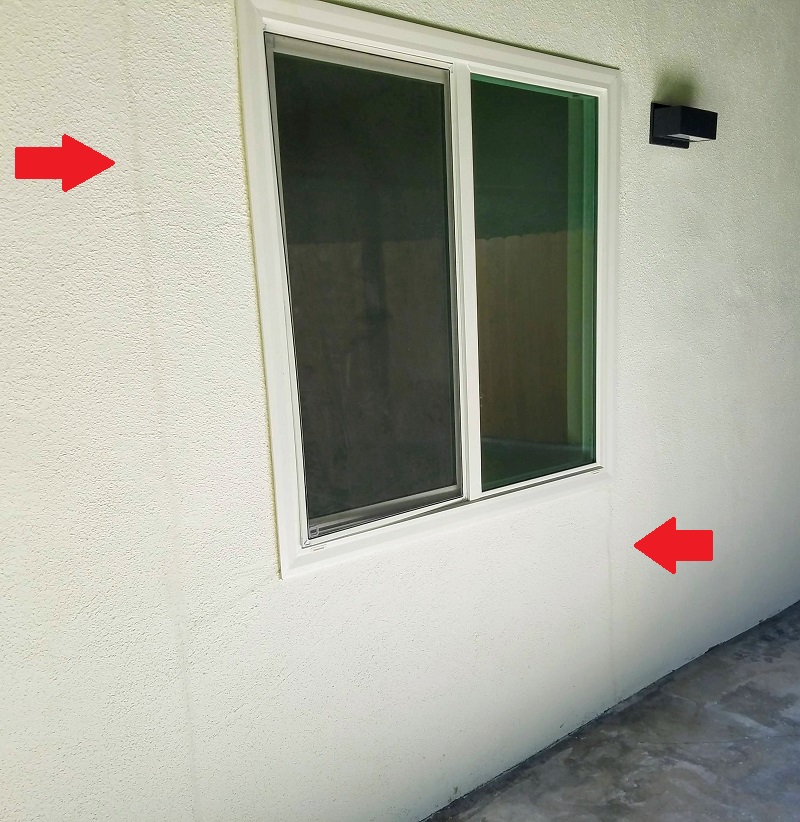
Painting Over the Border of a Removed Sliding Door
Unpermitted Additions or New Construction
If the home you are considering purchasing has an unpermitted construction, it is probably a good idea to pass on the purchase. Any seller who is willing to forego inspections of any item that calls for proper permitting is willing to take risks, risks that you do not want to inherit.
Flippers pride themselves on purchasing properties that require some remediation in order to resell the property at a higher price after minimal construction investment. However, cutting corners by not pulling permits or failing to get the property inspected after changes in framing, plumbing or electrical can result in serious issues for the buyer.
If you choose to purchase a property that has been renovated or upgraded without an independent professional assessment of the work, you run the risk of encountering several costly remediation situations.
Simply stated, there are some people doing residential construction work that are not qualified to perform that work. You can check for permits at your local building office or look for copies of permits in the real estate packet that the seller’s agent should provide.
Remember, if you buy a property that has unpermitted construction work, your home insurance policy can be canceled and an inspector can demand that you “undo” the unpermitted work.
Furthermore, if you attempt to sell the property, you are now responsible for selling a home with unpermitted or dubious construction, wiring, plumbing, etc., which may cost you more in the long run.
Also see:
Pre-Sale Renovations: An Alternative to Poorly Flipped Houses
For homebuyers specifically looking for Turnkey Properties, we highly recommend looking for properties that have undergone Pre-Sale Renovations by reputable firms like Revive and Curbio. Pre-sale renovation specialists work with homeowners and their agents to maximize their profits by implementing key upgrades that are in highest demand within a given local market.
Pre-sale renovations – also referred to as pre-listing renovations or pre-listing home improvements – are a form of house flipping, but they differ in that the homeowner seller earns a greater proportion of the “flipped” profits, while also sharing more disclosure information and transparency on the recent upgrades.
Additionally, firms like Revive and Curbio, have incentives to maintain trustworthy reputations to earn repeat business from their agent partners. In other words, they need to have records of fostering both happy homesellers and homebuyers! Real estate agents also have incentive to place homebuyers in properties that meet requisite quality standards, with minimal issues.
Pre-sale renovation firms have valuable opportunities to share and promote the positive experiences of satisfied homeowners that purchased one of their many “certified” upgraded homes. Upgraded homes from “pre-sale investor partnerships” can serve as a refreshing contrast to emerging “nightmare” experiences being chronicled by homeowners about inferior and disreputable house flippers.
How the Real Estate Industry can Help Remedy the Phenomena of Poorly Flipped Properties
Being familiar with the long-term potential of pre-sale renovation firms like Curbio and Revive, we are optimistic that the real estate market will somehow formalize certifications to verify the quality of recently conducted upgrades of newly listed properties.
It is imperative that key members of the real estate industry (e.g. agents, contractors, investors, inspectors, and building code administrators) collaborate to help homebuyers make purchases of investor upgraded properties confidently.
Here are a few ideas that come to mind:
- Quality pre-sale renovation companies, like Curbio and Revive, should establish industry standards that will differentiate the quality of their renovated homes from random house flippers.
- Real Estate Agents and Home Sellers should have incentive to provide transparency about their home as much as possible, in terms of warranties, repair records, contractors, known defects, etc.
- Reputable house flippers and pre-sale renovators should be willing to stand by their work by providing detailed information on the work conducted (pre-conditions), with minimal 1-year warranties on construction work defects and materials.
- Home Inspectors should be packaging their services into products that are easier for homeowners to understand: e.g.:
- Basic Inspections for smaller, newer properties
- Comprehensive Inspections larger, older properties
- Extensive Inspections for recently flipped properties of older homes that have minimal disclosure information
On the topic of home inspections, we would love to see the the Home Inspection Industry work towards developing standardized inspection scorecards that could help classify the quality and underlying risk of a given property across meaningful criteria, e.g.:
- Good Bones Score
- Does a property have a healthy and solid infrastructure (e.g. roofing, plumbing, electrical, foundation, and framing)?
- Turnkey Score
- How close is a property to being a truly, turnkey property that does not require any significant upgrades or amenities?
- Re-Do Score
- Does the property have any significant upgrade work that may needs to be redone due to quality standards or building code issues?
- Universal Design & Safety Score
- How conducive is the design of a property for meeting universal design principles for multigenerational living, aging-in-place, child-friendly spaces, ADA compliance, etc.?
- Flip Score
- How conducive is an “as-is” property to be restored into a quality “flipped house”?
- This could equate to a percentage likelihood that a given property should be razed or could be turned into a “Turnkey Property”. A low score would indicate a property is a candidate for razing, while a high score would indicate minimal work would be necessary for “turnkey” status.
Closing Comments
When encountering investor flipped houses on the market, we recommend keeping these rules of thumb in mind:
- Quality properties that are demanding top dollar will stand by their work with documentation, certifications, transparency, warranties and references
- Inferior properties and flippers will lack information, transparency and confirmation on materials and methods used
- If considering purchasing a flipped house, request to speak with homeowners that are currently living in other properties that the investor has upgraded
- Over spending on quality inspectors and their services is worth it, if these inspections can prevent you from buying a “moneypit heartache” house
- Trust your intuition – if you are not receiving the information and transparency you require to address risks, walk away from the deal and let the inherent risk be another person’s headache
- If still in doubt, Google “house flip regret”
Recommended Reading
- A Before vs Virtual vs Real Life Renovation Case Study
- 10 Traits of Innovative Homeowners
- Why Digital Twins are the Future of Homeownership
- Need Renovation Inspiration? Try These Innovative Design Resources!
- When to Get a Home Warranty & Alternatives to Seek When Not
- How to Plan & Manage a Renovation Successfully
- How to Choose a Qualified & Trustworthy Contractor
- How to Hire a Handyman Safely, Wisely & Virtually
- Unforeseen Circumstances: Planning for Post-Demolition Surprises
| Purgula is reader-supported. When you click on links to other sites from our website, we may earn affiliate commissions, at no cost to you. If you find our content to be helpful, this is an easy way for you to support our mission. Thanks! Learn more. |







